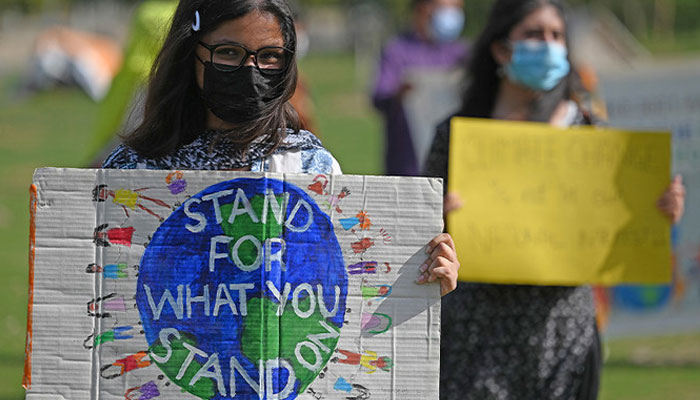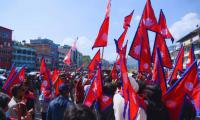The times they are a-sizzlin’
All around, things have been getting hot. The temperature is rising in the political sphere. And the calendar certifies that the long, hot summer is strengthening its grip across the plains of this country. But the current heatwave is a meteorological phenomenon we have to contend with. Here is another calamity that the constantly harassed people of Pakistan have to live through.
In some ways, this heatwave is one measure of how uncertain things can be. Look at how that ‘sudden extreme turbulence’ attacked a Singapore Airlines flight this week, leaving one passenger dead, 20 in intensive care and the rest all shaken and wounded.
Climate change is the name of the game. Experts have conjectured that climate change is a threat to the very survival of life on this planet. (The other threat to our survival, they say, is AI – artificial intelligence.) There is no end to stories of climatic disruptions and disasters in many different countries. However it may be divided in how many ways, the world is one big Titanic in the face of the climate crisis.
Meanwhile, we are concerned with this present heatwave. Naturally, our capacity to deal with this emergency is conditioned by our resources, the limitations of the structures of our governance and the available provisions of basic utilities such as power and water. Add to this the general impoverishment of the vast majority of the people.
Given these inadequacies, the authorities are seen to be doing their bit. School vacations have been adjusted and examinations have been postponed, in accordance with weather forecasts. It is a big story for the media. Necessary precautions, though not within the reach of all citizens, are repeatedly prescribed.
Karachi is not in the eye of the storm, so to say, but the memories of what happened in the city in 2015 have freshly been awakened by this heatwave. The severe heat that Karachi experienced in 2015 had resulted in as many as 1,200 deaths. About 50,000 people had fallen sick. Then, in 2018, a heatwave in the city killed 65 persons in just three days.
It may be valid to review the present weather conditions against the backdrop of the larger, global issue of climate change and how it affects Pakistan. That would be an expert’s assignment and I am not capable of it. I can only emphasize the fact that Pakistan is precariously positioned with reference to enduring threats posed by climate change or global warming.
Actually, the rain that fell in Sindh two years ago had shocked the world. Nothing like this, almost apocalyptic in its impact, had happened before. Here was evidence that Pakistan is at the forefront of the threat that climate change has become for the world. I read somewhere that Pakistan’s score on the Climate Risk Index is about 88 out of 100. Scary, isn’t it?
Incidentally, we share this heatwave with northern India because the weather does not recognize national borders. Severe heatwave conditions are being reported from Delhi and other places and, in the trivia sector, Bollywood star Shahrukh Khan was briefly hospitalized after suffering a heatstroke in Ahmedabad.
There are bound to be many more stories about much less privileged people, who would remain nameless, reported from numerous cities. Heat stress and high temperatures are bound to affect more manual workers and those who are very poor. Which means, literally, the multitudes who struggle to survive in this country. Experts have noted that the urban poor are particularly vulnerable to rising temperatures. They suffer in the context of health as well as livelihood.
While some attention is paid to these conditions when temperatures rise to exceptional and unbearable levels, the poor have to put up with high temperatures as a matter of routine every summer. That is what life is like in the plains. After all, weather is also a country’s destiny.
For that matter, are our summers some kind of a barrier to progress and economic development? I pose this question because I am reminded of how Gen Ayub Khan had once said that democracy was best suited to cold climates and not to the tropical climate of Pakistan. Was this why he thought that dictatorship would flourish in the summers of Pakistan?
I wonder if Gen Ayub Khan had given any thought to why India at that time – in the late 1950s – was functioning as a democracy. That it is no longer admired as a democracy during the rule of Narendra Modi would have many reasons. But is it that the long Indian summer has finally asserted itself?
I am playing with this fanciful thought to touch upon another hot issue of this week and it does relate to democracy in Pakistan and also in India. The media and civil society of Pakistan have been baffled by the haste with which the government of Punjab has rushed through Defamation Bill 2024. All independent observers agree that it is bad and dangerous legislation that would undermine the freedom of expression and media.
A democracy is judged by the fundamental freedoms it secures for the citizens of the country. Sadly, these freedoms are being curtailed in many countries of the world, including those that have cold climates. This week, advocate group Article 19 released its annual report that said that the number of people facing a ‘crisis’ in freedom of speech and information was the highest this century after a sharp rise from 34 per cent in 2022 to 53 per cent in 2023.
The report’s authors were particularly alarmed by the deterioration in India during the past 10 years under Modi, changing the classification from ‘restricted’ to ‘crisis’. Since we are ‘restricted’, here is one area in which we fare better than India in a global ranking.
You see, in the midst of deep depression, there may still be something like the waft of fresh air. But this will not lessen the intensity of the heat we must bear.
The writer is a senior journalist. He can be reached at: ghazi_salahuddin@hotmail.com
-
 Prince William Relying On TWO Royals For ‘valuable Support’
Prince William Relying On TWO Royals For ‘valuable Support’ -
 Demi Lovato Gets Honest About Her 'bratty' Behavior During Disney Days
Demi Lovato Gets Honest About Her 'bratty' Behavior During Disney Days -
 Megan Fox Makes Blunt Admission About Never Loving Her Body?
Megan Fox Makes Blunt Admission About Never Loving Her Body? -
 Princess Diana Relished THIS British ‘comfort Food’, Reveals Expert
Princess Diana Relished THIS British ‘comfort Food’, Reveals Expert -
 Ryan Gosling Reveals Secret Role Played By His Daughters In 'Project Hail Mary'
Ryan Gosling Reveals Secret Role Played By His Daughters In 'Project Hail Mary' -
 Kate Middleton ‘powerful Style Statement’ Keeps Away From ‘distractions’
Kate Middleton ‘powerful Style Statement’ Keeps Away From ‘distractions’ -
 Madeline Ross, Sister Of Popular Streamer Adin Ross, Dies At 36
Madeline Ross, Sister Of Popular Streamer Adin Ross, Dies At 36 -
 Princess Diana Disliked ‘silly’ Day Celebrated By Youth
Princess Diana Disliked ‘silly’ Day Celebrated By Youth -
 Nicole Kidman Says ‘I Can Remove All The Organs’ Ahead Of New Role
Nicole Kidman Says ‘I Can Remove All The Organs’ Ahead Of New Role -
 US Banks On High Alert For Cyberattacks As Political Tension Escalates
US Banks On High Alert For Cyberattacks As Political Tension Escalates -
 Rebecca Gayheart Marks Daughter Special Day 12 Days After Eric Dane's Death
Rebecca Gayheart Marks Daughter Special Day 12 Days After Eric Dane's Death -
 Sarah Ferguson Only Held Daughters For The Sake Of ‘cameras’
Sarah Ferguson Only Held Daughters For The Sake Of ‘cameras’ -
 Rachel Reeves Predicts UK Economy Will Outperform Forecasts, But Experts Remain Cautious
Rachel Reeves Predicts UK Economy Will Outperform Forecasts, But Experts Remain Cautious -
 Hailey Bieber Reveals Doctors Warned Her Not To Get Pregnant: 'It Was A Surprise'
Hailey Bieber Reveals Doctors Warned Her Not To Get Pregnant: 'It Was A Surprise' -
 Jeff Bezos's Wife Lauren Sánchez Recalls Most 'special' Moment From Italy Wedding
Jeff Bezos's Wife Lauren Sánchez Recalls Most 'special' Moment From Italy Wedding -
 Selena Gomez Discusses The 'coolest' Milestone She Shares With BFF Taylor Swift
Selena Gomez Discusses The 'coolest' Milestone She Shares With BFF Taylor Swift




